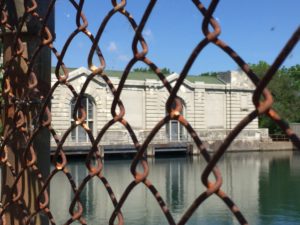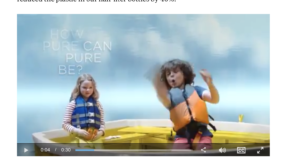Nestlé is launching a new brand campaign to celebrate hydration. How thoughtful.
It seems we’re just not educated enough about why it’s important to stay hydrated with safe drinking water. Mums, in particular, need to be educated about that one, according to the agency. On behalf of mothers everywhere, I want to thank you for helping us work that out.
Problem is, this celebration of water is pure spin from a company that has been raiding municipal supplies and rural aquifers for decades, paying pennies per million gallons in exchange for jobs at its processing plants. It takes some nerve to rebottle municipally treated water and lay claim to its health benefits.
Do they really think we’re going to believe that our tap water takes on some additional properties through the involvement of a plastic bottle? That’s actually more insulting than the mum thing.
At the same time, Nestlé is unapologetically dumping millions of plastic water bottles into the environment. Okay, Nestlé doesn’t throw water bottles in ditches or forests; its customers do that, but let’s see this campaign for what it is: it’s a way to try to change the conversation away from the insanity of bottled water in places with perfectly safe tap water, and to greenwash the very real problem of the waste this industry creates. At least the Nestlé bottles in the ditches and landfills have 40 percent less plastic (but only, apparently, the half litre ones).
Two adorable white kids in a row boat skipping stones in their magical water world are not doing anything more than attempting to create a lifestyle brand while they quietly feed the myth that municipal water just isn’t quite safe enough for our kids, and the solution is to put it in plastic bottles instead.
Their spokesperson correctly notes that no brand is standing up for water and I agree, but if Nestlé really wanted to make a difference, they’d go help clean up supplies for the almost 800-million folks who don’t have safe drinking water, instead of selling them cases of plastic.
They’d come up with bottles that biodegrade in less than a generation, and they’d stop holding municipalities for ransom while spinning doubt about the safety of public water supplies. And they would pay for the damn water they do bottle.
Thought leadership isn’t about making your questionable products and practices easier to swallow, it’s about adding a new and valuable dimension to the bit of the universe you’re qualified to talk about.
Dove’s campaign for Real Beauty is a good example of the subtle difference between adding to the conversation and spraying liquid manure all over it. The Dove campaign is, unabashedly, about selling their products, but it does so by teasing out a broader conversation among its ideal customers. In this case, women over 35, who, Dove correctly figured out, have a bunch of complicated issues about beauty.
In connecting their soap to honest, difficult issues, Dove opens up a dimension to their brand that has nothing to do with benefits, features or user experience, but has a great deal to do with the lived experiences of its ideal customers. These customers, incidentally, are all too happy to share and comment on the campaign assets across social channels.
Spin Class
Nestlé has managed not to tap into anything so profound. It is, instead, electing to challenge the fact that most of its ideal customers are usually within six feet of potable water, the quality of which lots of people would give anything to enjoy. Does the family in this older ad seriously have a drinking water problem?
Maybe if they live in Flint, MI, or in a Canadian First Nations community, but that’s not what we’re seeing here.
https://youtu.be/QhbE6IFv_5A
How about this family using bottled water to make pastry. Really? Their tap water, which comes from the same source as Nestle’s bottled water, is not safe enough to make pastry? Why aren’t these people marching in the streets if that’s the case?
Waving your left hand while the right one is picking pockets and making a mess is not thought leadership, brand building or even good marketing, it’s spin.
Opportunity vs. Spin
The worst part of it is Nestlé is actually walking right by a great opportunity to use its drinking water expertise to shine a light on just how rare and valuable a reliable source of clean water is. Forget the rich lady benefits of aprés boot camp hydration and let’s help Nestlé’s ideal customers understand the devastating effects of poor sanitation.
How cool would it be to have Nestlé tell its customers to not reach for a plastic bottle of their own tap water, but to donate that purchase price to an agency working to improve access to clean water for others?
How brave would it be to have Nestlé hydro-geologists working with government and aid groups to bring reliable sources of water to people who need it, and I don’t mean funding new municipal water treatment plants in California that reduce Nestlé’s cost of goods sold.
Sure, that will soften revenue and market share in the bottled water division, but I would bet that goodwill turns up in the food, cosmetic or pharma divisions.
Do we need a conversation about the politics and implications of clean water? Yes. Do we need someone creating fear and doubt about perfectly safe tap water while making us feel better about tossing plastic bottles in the ocean, not really.
Nestlé, you can do so much better.
Related Posts (or not)
Brands Gone Wild
Nine Things Great Brands Almost Always Get Right
BizMarketer is written by Elizabeth Williams
I help companies have better conversations
Drop me a line at ewilliams@candlerchase.com

Leave a Reply
You must be logged in to post a comment.